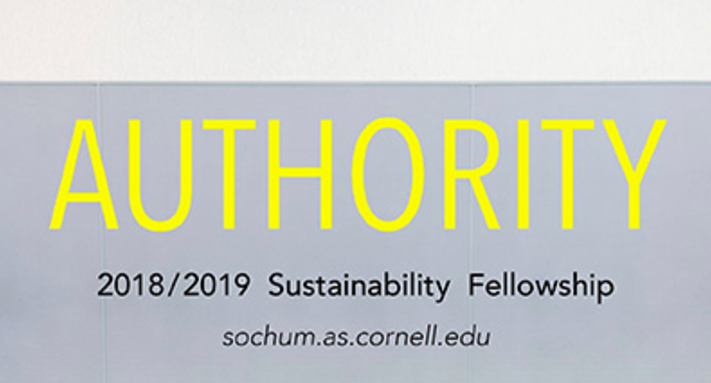
22 Aug 2018-2019 Sustainability Fellowship at Society for the Humanities, Cornell University
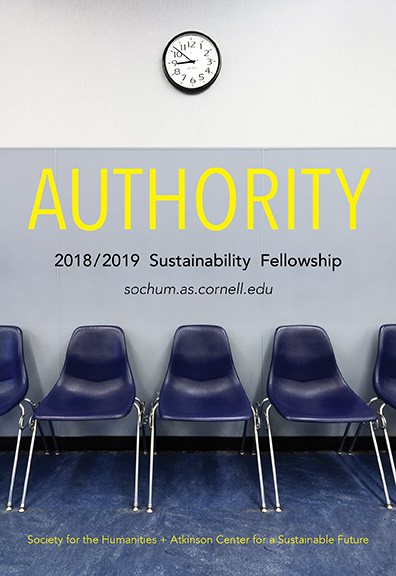 2018-2019 Sustainability Fellowship
2018-2019 Sustainability Fellowship
Jointly sponsored by the Society for the Humanities and the David R. Atkinson Center for a Sustainable Future at Cornell University
The Society for the Humanities together with the Atkinson’s Center invites applications for a one-year residential fellowship at Cornell University on the topic of AUTHORITY as it relates to sustainability, the environment, energy, or economic development.
The Society/Atkinson Fellow will collaborate with the Taylor Family Director of the Society for the Humanities, Paul Fleming, Professor of Comparative Literature and German Studies. The Invited Society Scholars will be Praesnijit Duara, Oscar Tang Chair of East Asian Studies at Duke University, Bonnie Honig, Nancy Duke Lewis Professor of Modern Culture and Media and Political Science at Brown University, and Holly Hughes, Professor of Theatre and Drama at University of Michigan.
Other residential fellows at the Society include scholars from other universities and members of the Cornell faculty released from regular duties, all working on the theme of Authority. Fellows spend their time in research and writing, participate in the weekly Fellows Seminar, and offer one seminar related to their research.
Additionally, the Society/Atkinson Sustainability Fellow will offer one public lecture on the topic of their research project in the Fall. The Sustainability Fellow will also be invited to attend Atkinson Center events and network with the Atkinson Center’s Faculty Fellows in Social Sciences, Humanities, and the Arts.
The fellowship carries a stipend of $54,000. Applicants living outside North America are eligible for an additional $2,000 to assist with travel costs.
Focal Theme 2018-2019: AUTHORITY
The Society for the Humanities at Cornell University seeks interdisciplinary research projects for residencies that reflect on the philosophical, aesthetic, political, legal, ecological, religious, and cultural understandings of authority.
From auctoritas to the author to authoritarianism, the question of authority – whether grounded in epistemological expertise, juridical power, rhetorical persuasiveness, creative innovation, divine decree, or political charisma – is inextricable from humanistic inquiry and critique. With authority, the power to decide, to authorize, to adjudicate, to rule, and to hold sway stands or falls – in science, law, art, oratory, religion, or politics. The Society invites scholarly projects that trace the consequences, crises, and possibilities of authority across historical periods, disciplinary boundaries, geographic territories, and social contexts.
At stake in authority is who or what authorizes and bestows power, prestige, and influence. On what basis does authority claim to rule? Knowledge? Law? Charisma? Popular will? The sovereign word? Tradition? Moreover, each expression of authority calls forth its contestation and opposition. At times authority is contested within the same discursive sphere (e.g. different scientific paradigms or hermeneutic interpretations at loggerheads); at times, however, the opposition is based on another source of authority: religious law vs. secular law; scientific knowledge vs. political will; economic concerns vs. ethical concerns. At such junctures, the question then arises: who or what power adjudicates the conflict between appeals to different authoritative instances?
The Society invites scholars to explore the ‘ends of authority,’ understood as its purposes, goals, and ideals as well as its limitations, aporias, and paradoxes. Applicants could investigate the rise of authoritarianism across different historical and political or religious contexts, exploring its conditions, its appeal, its critiques. One could research the crisis of scientific authority, in which expertise itself is called into question on grounds that are often impervious to scientific argumentation. Considering the death of the author, one could question what signs, strokes, words, tics, and idiosyncrasies determine a text’s or artwork’s ‘author’; what authorizes an original from its copy or fake; or the degree to which the authority of a few authors still determines research fields today. In the age of a superabundance of information, what differentiates ‘real’ (authoritative) information from ‘fake news,’ and how one can be interchanged with the other as an ‘equal’ source of authority?
The Society for the Humanities welcomes applications from scholars and practitioners who are interested in investigating authority from the broadest variety of international and disciplinary perspectives.
Qualifications:
Applicants should be working on a topic in the humanities that addresses authority as it relates to energy, the environment, or economic development. Their approach to the humanities should be broad enough to appeal to students and scholars in several humanistic disciplines. Applicants must have received the Ph.D. degree before January 1, 2017. The Society for the Humanities will not consider applications from scholars who received the Ph.D. after this date. Applicants must also have one or more years of teaching experience, which may include teaching as a graduate student.
Application Procedures:
The following application materials must be submitted via Academic Jobs Online fellowship #9274 on or before OCTOBER 1, 2017. Any other method of applying will not be accepted.
- A curriculum vitae
- A one-page abstract describing the research project the applicant would like to pursue during the term of the fellowship (no more than 300 words)
- A two-page statement describing how your proposed project relates to sustainability as well as its potential long-term impact in influencing behavior, practice, procedures, or policy at a significant scale to help implement sustainable solutions.
- A detailed statement of the research project (1,000 – 2,000 words). Applicants may also include a one-page bibliography of the most essential materials to the project.
- A course proposal for a seminar related to the applicant’s research. Seminars meet two hours per week for one semester and enrollment is limited to fifteen advanced undergraduates and graduate students. The course proposal should consist of:
- A brief course description suitable for the University course catalog (50 – 125 words)
- A detailed course proposal (up to 300 words)
- A list of the essential texts for the course
- One scholarly paper (no more than 35 pages in length)
- Two letters of recommendation from senior colleagues to whom candidates should send their research proposal and teaching proposal. Letters of recommendation should include an evaluation of the candidate’s proposed research and teaching statements. Please ask referees to submit their letters directly through the application link. Letters must be submitted on or before OCTOBER 1, 2017.
To apply, go to: https://academicjobsonline.org/ajo/fellowship/9274
Please note, to be considered for the Society/Atkinson Sustainability Fellowship, applicants will need to be sure to upload the sustainability statement (item 3), which is an optional application material on the AJO site.
Awards will be announced by the end of December 2017.
Diversity and Inclusion are a part of Cornell University’s heritage. We are an employer and educator recognized for valuing AA/EEO, Protected Veterans, and Individuals with Disabilities.
Note: Extensions for applications will not be granted. The Society will consider only fully completed applications. It is the responsibility of each applicant to ensure that ALL documentation is complete, and that referees submit their letters of recommendation to the Society before the closing date.
The Society for the Humanities
The Society for the Humanities was established at Cornell University in 1966 to support research and teaching in the humanities. It is intended to be at once a research institute, a stimulus to educational innovation, and a continuing society of scholars. The Society and its Fellows have fostered path-breaking interdisciplinary dialogue and theoretical reflection on the humanities at large.
David R. Atkinson Center for a Sustainable Future
Founded by a generous gift from David and Pat Atkinson, the David R. Atkinson Center for a Sustainable Future empowers faculty to think outside of their departments and across disciplines when it comes to tackling the world’s greatest challenge—creating a vital and resilient future for the global community.
For more information, visit sochum.as.cornell.edu.
Questions about the fellowship: humctr@cornell.edu or (607) 255-9274.
image © Richard Ross, richardross.net


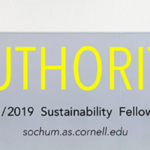
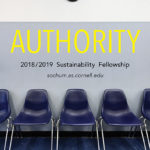
No Comments